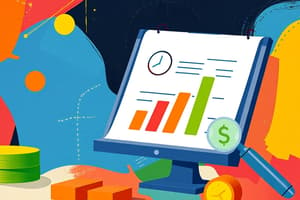Podcast
Questions and Answers
What is the main purpose of cost accounting?
What is the main purpose of cost accounting?
- To allocate overhead costs
- To determine the profitability of products
- To provide accurate and timely information to decision-makers (correct)
- To track and manage the costs associated with producing goods and services
What does cost accounting involve?
What does cost accounting involve?
- Tracking employee salaries and benefits
- Identifying, measuring, and recording costs incurred during the production process (correct)
- Managing sales and marketing costs
- Maintaining financial records for tax purposes
What are some common cost accounting techniques used?
What are some common cost accounting techniques used?
- Activity-based costing and variable costing (correct)
- Customer relationship management and inventory management
- Social media marketing and influencer marketing
- Advertising and promotional techniques
What is one of the advantages of cost accounting for businesses?
What is one of the advantages of cost accounting for businesses?
What does cost accounting aim to provide to decision-makers?
What does cost accounting aim to provide to decision-makers?
How does cost accounting help in making pricing decisions?
How does cost accounting help in making pricing decisions?
What is the main purpose of cost accounting?
What is the main purpose of cost accounting?
What is the process of determining the cost of producing a product or service?
What is the process of determining the cost of producing a product or service?
Which type of cost cannot be directly attributed to a specific product, service, or activity?
Which type of cost cannot be directly attributed to a specific product, service, or activity?
Which type of cost varies directly with the level of production or sales?
Which type of cost varies directly with the level of production or sales?
What is the process of creating a plan for how resources will be allocated and used?
What is the process of creating a plan for how resources will be allocated and used?
Which technique involves costs that remain constant regardless of the level of production or sales?
Which technique involves costs that remain constant regardless of the level of production or sales?
What is essential for creating accurate budgets and tracking actual costs against budgeted amounts?
What is essential for creating accurate budgets and tracking actual costs against budgeted amounts?
Which technique involves costs that can be directly attributed to a specific product, service, or activity?
Which technique involves costs that can be directly attributed to a specific product, service, or activity?
What does cost accounting help businesses allocate effectively?
What does cost accounting help businesses allocate effectively?
What can cost accounting help businesses identify through analyzing cost data?
What can cost accounting help businesses identify through analyzing cost data?
Flashcards are hidden until you start studying
Study Notes
Understanding Cost Accounting: A Comprehensive Guide
Cost accounting is a financial management method used to track and manage the costs associated with producing goods and services. It involves identifying, measuring, and recording the costs incurred during the production process, which helps businesses make informed decisions about pricing, production, and resource allocation. In this article, we will explore the basics of cost accounting, its advantages, and some common cost accounting techniques.
Basics of Cost Accounting
Cost accounting is a systematic and standardized method of identifying, measuring, and recording the costs of products, services, or activities. It is used to track the costs of production, determine the profitability of products, and allocate overhead costs. The main purpose of cost accounting is to provide accurate and timely information to decision-makers so they can make informed choices about production, pricing, and other business activities.
Advantages of Cost Accounting
Cost accounting offers several advantages for businesses, including:
-
Informed decision-making: By providing accurate and timely cost information, businesses can make informed decisions about pricing, production, and resource allocation.
-
Cost control: Cost accounting helps businesses identify and control costs, ensuring that they are being used efficiently and effectively.
-
Product costing: Cost accounting is essential for product costing, which is the process of determining the cost of producing a product or service.
-
Resource allocation: Cost accounting helps businesses allocate resources effectively by providing information on the costs associated with different activities or projects.
-
Cost reduction: By analyzing cost data, businesses can identify opportunities for cost reduction and improve their bottom line.
Common Cost Accounting Techniques
Several techniques are used in cost accounting to track and manage costs. Some of the most common techniques include:
-
Direct costs: These are costs that can be directly attributed to a specific product, service, or activity. Examples include raw materials, labor costs, and direct overhead costs.
-
Indirect costs: These are costs that cannot be directly attributed to a specific product, service, or activity. Examples include rent, utilities, and indirect labor costs.
-
Variable costs: These are costs that vary directly with the level of production or sales. Examples include raw materials and labor costs.
-
Fixed costs: These are costs that remain constant regardless of the level of production or sales. Examples include rent, salaries, and depreciation.
-
Budgeting: Budgeting is the process of creating a plan for how resources will be allocated and used. Cost accounting is essential for creating accurate budgets and tracking actual costs against budgeted amounts.
In conclusion, cost accounting is a valuable tool for businesses seeking to make informed decisions about production, pricing, and resource allocation. By understanding the basics of cost accounting, businesses can take advantage of its benefits and use it to their advantage in the competitive marketplace.
Studying That Suits You
Use AI to generate personalized quizzes and flashcards to suit your learning preferences.




